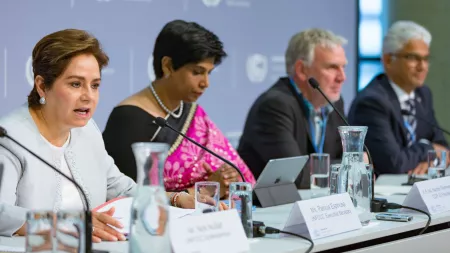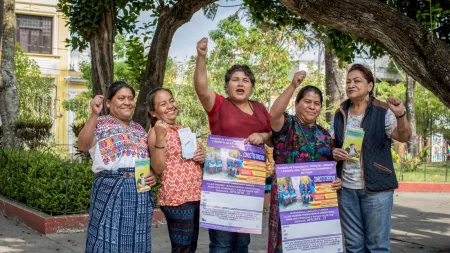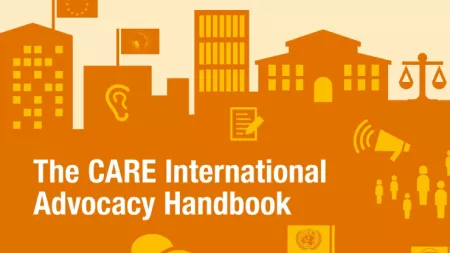
CARE International statement on the Summit of the Future, Interactive Dialogue 4
If we are to realise the gender just vision set out in the Pact for the Future, States need to urgently lay essential foundation stones now.

Through a global and coordinated advocacy strategy, we believe that we can multiply the scope of our impact beyond program funding and technical support to influence national and international policies.
At CARE International, we advocate to advance the rights and priorities of women, girls, and marginalized communities in all their diversity.
We work with partners – at grassroots, national, regional, and global levels – to influence change in line with the United Nations Sustainable Development Goals and CARE’s Vision 2030. CARE’s advocacy enables greater impact and increased accountability for commitments to fight poverty and inequality.

Gender equality is at the center of all we do, so our advocacy focuses on tackling deeply entrenched inequalities which impact marginalized communities, particularly women and girls. Enabling women and girls to be heard is core to our vision.
Protracted humanitarian crises, the climate emergency, and COVID-19 have only exacerbated gender inequality and thus made our focus on women and girls even more critical.
CARE works across humanitarian, development, and peace-building contexts to advance social justice and promote human rights for people of all genders.
CARE advocates for change across six Impact Areas – our areas of focus to drive change towards Vision 2030, these are Climate Justice; Gender Equality; Crisis Response; Right to Health; Right to Food, Water, and Nutrition; and Women’s Economic Justice.
Over the next couple of years, we will be working with our many partners to achieve much-needed breakthroughs in two key areas:
Through advocacy we aim to:
Read our Global Advocacy Roadmap
Active collaboration is at the heart of CARE International's Advocacy. Through constant communication, cooperation and guidance from activists women across the globe, we are better equipped to help advance women’s and girls’ rights across sectors.
The Women’s Action for Better Advocacy (WABA) is an independent body that holds an important seat in our global cooperation efforts. It brings together feminist leaders and activists from around the world, including leaders on advocacy, policy-making and programme delivery in crises and complex emergencies, as well as leading women and youth activists in the field of women’s rights.
By fostering connections between members and CARE, WABA furthers the work of members’ respective organizations, networks, and movements, and informs the advocacy work of CARE.

The Global Advocacy Handbook is a toolkit of approaches, techniques, and additional resources to help CARE staff think about how to integrate advocacy into their work.
Read
If we are to realise the gender just vision set out in the Pact for the Future, States need to urgently lay essential foundation stones now.

In a new Rapid Gender Analysis (RGA) on Ukraine, CARE and the Gender in Humanitarian Action Working Group reveal the increased risk of sexual and domestic violence faced by thousands of families still living in frontline regions.
New displacement orders issued by Israeli authorities have forced another mass movement of families and humanitarian workers from areas in Deir al-Balah - one of the only remaining areas in the occupied Gaza Strip with essential infrastructure and warehouses storing aid supplies.

As we mark World Humanitarian Day, we put the spotlight on six women aid workers who are bringing desperately needed relief to people facing crises, especially women and girls.

Fleeing their village due to repeated shelling, Samira* and her family of 13 people have been living in a refugee camp in Northwest Syria for five years now. In this account, she shares the difficulties faced due to displacement, with scarcity of water, poor sanitation, and living in tents with no protection from the cold.
To address the sexual and reproductive health (SRH) needs of pregnant adolescents and first-time mothers in crisis-hit countries, the Adolescent Mothers Against All Odds (AMAL) initiative was launched to promote access to SRH information and services while creating conversations around gender, power, and social norms to support a more enabling environment for adolescents to seek care.

CARE International Secretariat is looking for an intern to support the advocacy of the organisation at the EU level, by contributing to research and analysis of EU policies with related to development, humanitarian aid, and external action.

CARE International's Secretariat is looking for a Gender and Policy Coordinator for it's global governance, policy management, and organisational accountability and to facilitate the implementation of its Gender Equality and Inclusion Policy across the confederation.

The unsung heroes of crisis, women are grossly overlooked when it comes to dialogue and decision-making. This report by CARE, based on a survey conducted since 2020, highlights women’s experiences in conflict and how their leadership is critical for surviving a crisis.
In FY2023, CARE worked around the world, contributing to saving lives, fighting poverty, and increasing social justice.